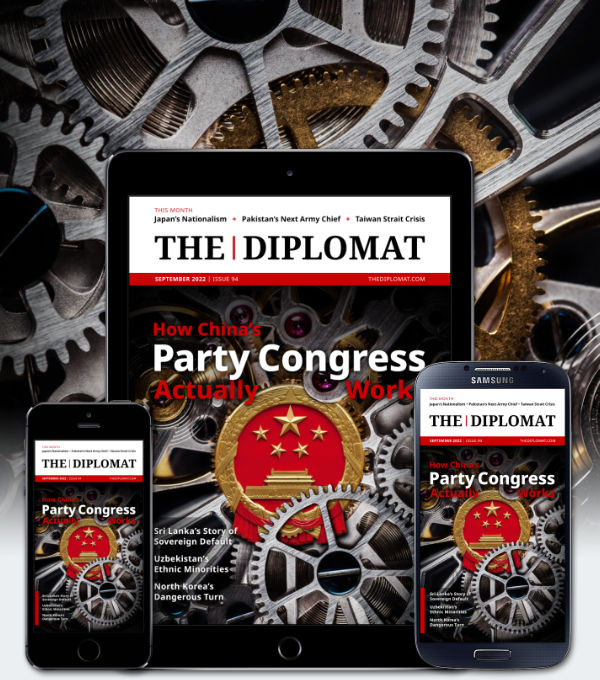| Welcome to the latest issue of Diplomat Brief. This week our top story explores the actual governance abilities of Myanmar’s National Unity Government. We also have an interview with Argentinean economist Osvaldo Cortesi on the contradictions and trajectory of China’s economy. |
| Story of the week |  | Politics Is Myanmar’s National Unity Government Ready to Govern?What Happened: Since Myanmar’s military seized control of the capital in a February 2021 coup, the ousted democratically elected government has reformed itself – in alliance with major ethnic organizations – into the National Unity Government. But can the NUG actually govern? For International IDEA, democratic governance expert Philipp Annawitt led a team that mapped the NUG’s capacities and needs to try and answer that question. Our Focus: “For our assessment, we reviewed a number of NUG strategic documents, engaged with most of its ministries, spoke to its ethnic nationality allies, and looked at life in communities,” Annawitt writes for The Diplomat. “My verdict is: Yes, the NUG can govern, if it maintains its unity and coherence and receives more support from outside.” In more detail, he acknowledges that the NUG’s capacity to prevent atrocities by the military remains limited, and its funding constraints hamper services provision. That said, “The NUG now controls significant territory, commands the loyalty of the overwhelming majority of its people, and provides security and justice in the areas under its control.” What Comes Next: Annawitt notes that the NUG provides a workable blueprint for the future federal structure of Myanmar – something that could, if implemented, end internal conflicts that have raged since Myanmar’s independence. It is “developing a transitional federal constitution that will lay the path to turn Myanmar into a highly decentralized liberal democracy with a separation of powers and guarantees for fundamental rights and freedoms.” The question now, Annawitt writes, is whether the world powers, especially the United States and China, are willing to accept the NUG as Myanmar’s legitimate political future. If so, international engagement needs to start now. Read this story |
| Behind the News | INTERVIEW Osvaldo CortesiArgentinean economist Osvaldo Cortesi on the crossroads facing China in 2022: “The big discussion is whether China will Sinicize Marxism or Sinicize capitalism. The internal contradictions in China are getting stronger and stronger.” Read the interview |
| This Week in Asia | Northeast Asia How Will North Korea Respond to South Korea-US Joint Drills?In late August, South Korea and the U.S. resumed large-scale military exercises for the first time in five years. North Korea has been oddly quiet in response – until Sunday, when its state media ran several statements slamming the drills as aggressive provocations. But will Pyongyang seize the chance return to its missile-testing flurry of early 2022 or even pull the trigger on a nuclear test? Meanwhile, Japan, South Korea, and the U.S. held a trilateral security advisors’ meeting to discuss coordinated responses on the North Korea issue. Find out more | South Asia Bangladesh’s PM Visits IndiaBangladeshi PM Sheikh Hasina is in India this week, looking to further the bilateral relationship between the neighbors. She has already signed a flurry of deals, including a water-sharing pact (although not Dhaka’s long-hoped-for deal on the Teesta River). But all eyes are on the potential for progress on the Bangladesh-India Comprehensive Economic Partnership Agreement, with talks launched during Hasina’s visit. Find out more | Southeast Asia Indonesia Slashes Fuel SubsidiesAfter spending billions of dollars in order to shield consumers from rising global oil prices, Indonesia’s government this week cut its fuel subsidies, citing budget pressures. The move led to a more than 30 percent jump in the price of petrol, and motorists lined up for hours prior to the price hike on Saturday. The move is unlikely to be unpopular – protests have already broken out in some parts of Indonesia – but Joko Widodo’s administration is in a good position to weather the storm, while the reduction in the subsidy will likely bring a net economic benefit over the long term. Find out more | Central Asia Kazakh Opposition Hopes to Organize Against Snap ElectionA gathering of Kazakh opposition figures and activists announced their intention to fight the looming, but as-yet unscheduled, snap presidential election called for by President Kassym-Jomart Tokayev last week. The next day, one of the opposition politicians who had attended the meeting was among those roughly detained protesting the government's handling of the January events in Nur-Sultan. Tokayev may want new elections to usher in a new chapter, but not everyone in Kazakhstan is ready to move on from Bloody January. Find out more |
| Visualizing APAC |  | Prime Minister Narendra Modi commissioned India’s latest aircraft carrier, INS Vikrant, on September 2. See the full picture |
| Word of the Week | Environment Jangan bikin gaduhBahasa Indonesian for “do not escalate first,” it has become the motto of Indonesian naval forces responding to Chinese incursions into Indonesia’s Exclusive Economic Zone. Find out more |
|  |




